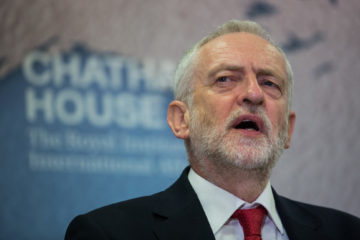Nando’s is a pretty cool place. Millions of British teenagers, students, and the celebrities they idolise frequent the South African chicken restaurant chain. Unsurprisingly, the members of the new party Change UK, then still The Independent Group (TIG), could not resist the temptation to borrow Nando’s trendy glow for their marketing purposes. Having vowed to overthrow the British two-party political system with a new style of politics, the group chose the equally cheeky chicken place for their first public outing.
Yet the complementary Twitter post mostly triggered mockery. Users and journalists were quick to point out the atypical food that was ordered, including bottled water, white wine, salad, and the fact that no one seemed to have used the characteristic Nando’s sauces – all of which implied that some of the MPs had never been to the place before. More than a few looked correspondingly misplaced. One user summarises: “I’ve never seen something more out of touch.” A failure characteristic of the Change UK project.
A new political force, “bang smack in the centre ground,” as Change UK MP Heidi Allen put it, unambiguously pro-European, breaking the outdated dominance of Labour and Tories – that was the supposed goal of the rogue Labour and Conservative MPs who founded Change UK this spring. After the party did not win a single seat at the European Elections, one may yet safely speak of a failed project. Leading figures such as spokesman Chuka Umunna as well as interim leader Allen have quit.
Yet that does not amount to a meaningful proof that centrist-liberal parties must necessarily remain side-lined in British politics. For once, the disappointing election results can be blamed on a campaign full of gaffes. There were problems with the logo and the party’s name that resembled the one of the petition website change.org UK. Even more seriously, numerous candidates resigned short before the election: two did so over offensive social media posts while the Scottish lead candidate lost faith in the success of the project. High-ranking officials, including Allen, also openly sympathised with a voting recommendation for the Liberal Democrats.
Previous statements of the party sound curious in this context. “…There are going to be no mergers. We are not going to go and join the Liberal Democrats, let’s be absolutely clear about that. We are saying there needs to be a new offer and a new alternative”, spokesman Umunna said earlier. He has now joined the same party he refused to merge with. An unnamed MP went even further when asked about potential cooperation with the Lib Dems: “If the Lib Dems want to join us then fine, but otherwise no. They are a problematic brand.” Likewise, pre-election alliances with other pro-European parties were rejected – which turned out to be deeply misplaced. It was namely mostly a mixture of the Liberal Democrats’ success and Change UK’s lack of profile and political will that sealed their fate. Without a cooperation agreement, the Lib Dems were the main competitor for the euro-friendly, liberal vote. The Change UK leadership utterly underestimated them, seeing themselves in a position of strength and the Liberal Democrats as burnt since the 2010 coalition with the Conservatives.
As it turned out the situation was the exact reverse. The Lib Dems worked well as a focal point for centrist Remain voters. Polling second behind the Brexit Party in the European Elections, they showed that there surely is demand for liberal-centrist policies. Change UK, by contrast, missed out on these votes due to their misguided focus. Beyond Nando’s photo shootings, their strategy included a cool nickname (“Tiggers”), and colourful-sign featuring happenings, that seemed strangely sterile and staged. Umunna wore youthfully bright T-shirts and Allen employed girl pal vocabulary when describing the Tory defectors as a fun group of “three amigos” (a narrative reproduced by the press). So, Change UK tried hard to look like a hip liberal party, yet did not manage to cover that there was barely any substance behind this look.
The party lacked truly charismatic political leaders as prominent Labour and Tory rebels did eventually not join. With a candidate list including BBC presenter Gavin Esler, a former Polish vice-Prime Minister, and Boris Johnson’s sister Rachel Change UK appeared more like a political I’m A Celebrity line-up than a serious contender.
There was also the lack of content. Merely 11 “values” had been published shortly after the formation. Yet these were vague statements of intention. That international cooperation, social justice, and environmental issue are of concern to them could possibly be supported by almost any other party in the Commons. Somewhat tellingly, only 38% of voters managed to identify the party as a pro-European one in a YouGov pre-election survey.
Even more so, Change UK’s official communication felt at a times like a copy of the Lib Dem 2017 election manifesto. There is the Lib Dem slogan “Change Britain’s future”, which resembles Change UK’s very own name. There is the Lib Dem’s express concern for a dichotomous yet broken system that needs to be overcome – strongly reminiscent of Change UK’s goal to bridge the outdated Labour-Tory divide, let alone their slogan “Politics is broken. Let’s change it.” Content-wise, Liberal Democrats and Change UK essentially offered the same anyway.
All this confirms critics that saw Change UK not as a policy project but an assembly of MPs on a mission to save their careers: with Umunna “permanently looking for something to lead” and many of the Labour and Tory rebels trying to escape deselection by their more extreme local parties.
Voters attracted to liberal policies were not offered a distinct reason why they should vote for Change UK rather than for the established, well-known alternative. If any were afraid that voting for the Lib Dems would be a waste of their vote after their underwhelming performances since 2010, the May local elections were reassuring.
Umunna, Allen, and friends should have recognised this and focussed on strengthening the centre vote by joining forces with allies. Yet they seem to have been too busy guarding their expected success through glossy marketing against potential shareholders. Too late did they realise that they were actually out-manoeuvring themselves.
The case of Change UK does therefore not offer any insights on the future of centrism in British politics. If anything, they have shown that centrist parties and Nando’s pics are quite alike. They don’t work if you’re not truly in for what they are: be it politics or chicken.




